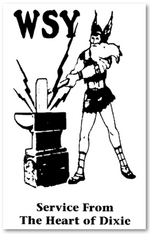WSY-AM: Difference between revisions
| Line 3: | Line 3: | ||
== History == | == History == | ||
[[Donald Beatty]] constructed an unlicensed experimental voice station on the 2nd floor of [[Matthews Electric]] on the 200 block of [[1st Avenue North]] in [[1921]]. He used the station to broadcast weather reports to receiver-equipped aviators and had his girlfriend, [[Mary Alice Beatty|Mary Alice Gatling]], play piano over the air. Her Chopin etude wasn't loud enough to be picked up, but her more powerful rendition of Rachmaninoff's Piano Concerto No. 2 was loud enough to blow out much of the amplification equipment. | [[Donald Beatty]] constructed an unlicensed experimental voice station, called '''WIAG''', on the 2nd floor of [[Matthews Electric]] on the 200 block of [[1st Avenue North]] in [[1921]]. He used the station to broadcast weather reports to receiver-equipped aviators and had his girlfriend, [[Mary Alice Beatty|Mary Alice Gatling]], play piano over the air. Her Chopin etude wasn't loud enough to be picked up, but her more powerful rendition of Rachmaninoff's Piano Concerto No. 2 was loud enough to blow out much of the amplification equipment. | ||
Alabama Power purchased Beatty's equipment and launched WSY as [[Alabama]]'s first licensed radio station (and the 127th in the U.S.A.) on [[April 24]], [[1922]]. They utilized a "wired wireless" means of transmitting their signal via high-tension power lines in order to communicate to isolated steam plants and rural work crews. Not long after, the company began receiving letters from residents across the state thanking them for broadcasting things like weather reports and making programming suggestions. The utility responded by adding interviews, stock quotes, an orchestra composed of Alabama Power employees, a show featuring a Tuskegee Institute quartet, and five [[Birmingham]] church services to their programming. | Alabama Power purchased Beatty's equipment and launched WSY as [[Alabama]]'s first licensed radio station (and the 127th in the U.S.A.) on [[April 24]], [[1922]]. They utilized a "wired wireless" means of transmitting their signal via high-tension power lines in order to communicate to isolated steam plants and rural work crews. Not long after, the company began receiving letters from residents across the state thanking them for broadcasting things like weather reports and making programming suggestions. The utility responded by adding interviews, stock quotes, an orchestra composed of Alabama Power employees, a show featuring a Tuskegee Institute quartet, and five [[Birmingham]] church services to their programming. | ||
Revision as of 13:14, 20 March 2010
WSY was a 500-Watt AM radio station operated by Alabama Power in the early 1920s. The station's first studio was located at 1921 Powell Avenue. It later moved to the radio department, on the top floor of the downtown Loveman's department store. As one of the country's earliest radio stations, it had the ability to reach people as far away as Canada and Cuba.
History
Donald Beatty constructed an unlicensed experimental voice station, called WIAG, on the 2nd floor of Matthews Electric on the 200 block of 1st Avenue North in 1921. He used the station to broadcast weather reports to receiver-equipped aviators and had his girlfriend, Mary Alice Gatling, play piano over the air. Her Chopin etude wasn't loud enough to be picked up, but her more powerful rendition of Rachmaninoff's Piano Concerto No. 2 was loud enough to blow out much of the amplification equipment.
Alabama Power purchased Beatty's equipment and launched WSY as Alabama's first licensed radio station (and the 127th in the U.S.A.) on April 24, 1922. They utilized a "wired wireless" means of transmitting their signal via high-tension power lines in order to communicate to isolated steam plants and rural work crews. Not long after, the company began receiving letters from residents across the state thanking them for broadcasting things like weather reports and making programming suggestions. The utility responded by adding interviews, stock quotes, an orchestra composed of Alabama Power employees, a show featuring a Tuskegee Institute quartet, and five Birmingham church services to their programming.
In January 1923, the station's studio was moved to the radio department in the top floor of Loveman's downtown department store. By the fall of that year, the station was so successful Alabama Power faced having to hire employees dedicated solely to running the station. The company opted instead to get out of the radio business. The station's equipment was donated to Alabama Polytechnic Institute, which would later become Auburn University, and used to launch WAPI-AM in 1925.
References
- Carmichael, Mary Alice Beatty (1998) Donald Croom Beatty: Alabama's Aviator, Explorer, and Inventor' self-published
- Spencer, Thomas. (February 6, 2007). "Early days of radio on display." The Birmingham News.
- "WSY: 1922–1992". PDF (1992).
- "History of WAPI." (n.d.) WAPI-AM. Accessed February 7, 2007.
